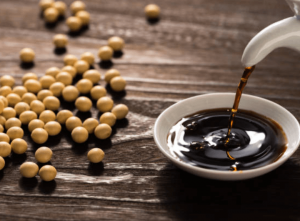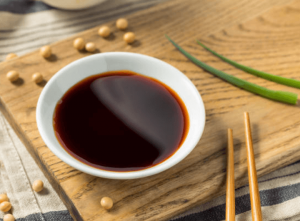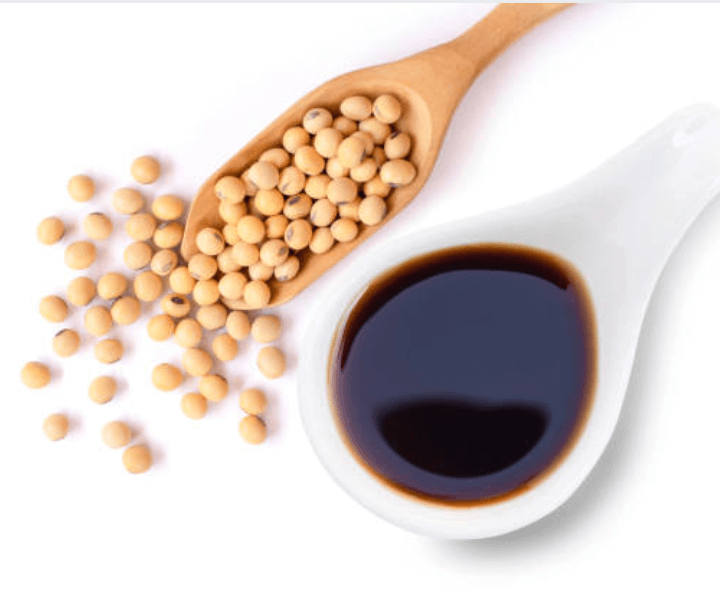During pregnancy, it’s natural to question what foods are safe to consume. One common concern is whether it’s okay to indulge in that umami-packed condiment we all know and love: soy sauce. Rest assured, dear reader, you don’t have to give up your soy sauce fix just yet. Contrary to popular belief, soy sauce is perfectly safe to enjoy during pregnancy. Packed with rich flavors and low in calories, you can continue to add a splash of this savory delight to your stir-fries and sushi without any worries. So go ahead and satisfy those cravings guilt-free, knowing that your love for soy sauce won’t harm you or your little one.
This video is a property of Health-WHYS.
Can I Eat Soy Sauce During Pregnancy?
When it comes to pregnancy, there are a lot of factors to consider in terms of what foods are safe to consume. Soy sauce, a staple condiment used in many cuisines around the world, is often a topic of concern for expecting mothers. In this article, we will explore the relationship between soy sauce and pregnancy, discussing its nutritional content, potential concerns, and safe consumption guidelines. It’s essential to stay informed and make informed choices to ensure a healthy pregnancy for both you and your baby.
Understanding Soy Sauce
Before delving into the specifics of soy sauce and pregnancy, it’s important to have a good understanding of what soy sauce is and its cultural significance. Soy sauce is a dark, flavorful condiment made from fermented soybeans, roasted grains, water, and salt. It has been a key ingredient in many Asian cuisines for centuries and has also made its way into Western cooking in recent years. Soy sauce adds a rich umami flavor to dishes and is used as a seasoning or dipping sauce.
>> Can babies eat cream of wheat
Nutritional Content of Soy Sauce
When it comes to considering the safety of consuming soy sauce during pregnancy, understanding its nutritional content is crucial. Soy sauce is relatively low in calories but contains a notable amount of sodium. It also provides small amounts of macronutrients such as protein and carbohydrates, along with micronutrients like iron and potassium. While soy sauce is not a significant source of essential vitamins and minerals, it does contribute to the overall flavor profile of meals.

One aspect of soy sauce’s nutritional content worth highlighting is its supply of essential amino acids. Amino acids are the building blocks of protein and are vital for various physiological functions. While the amounts of essential amino acids in soy sauce are relatively small compared to other high-protein foods, they still offer a minor contribution to overall dietary protein intake.
Pregnancy and Dietary Guidelines
During pregnancy, it’s crucial to follow the recommended dietary guidelines to support the healthy development of your baby. A balanced diet is essential, emphasizing a variety of nutrient-rich foods while avoiding harmful substances. It’s important to note that soy sauce is not inherently harmful during pregnancy, but it’s crucial to consume it in moderation and be mindful of potential concerns.
Common foods that pregnant women are advised to limit or avoid include soft cheeses, raw seafood, and deli meats. These guidelines are in place to reduce the risk of bacterial infections such as Listeria or Salmonella. Soy sauce, on the other hand, is free from such concerns as it undergoes a fermentation process that eliminates the risk of bacterial contamination.
Potential Concerns with Soy Sauce Consumption
While soy sauce is generally safe for consumption during pregnancy, there are a few potential concerns to be aware of. The most significant concern is its high sodium content. Excessive sodium intake has been linked to increased blood pressure, fluid retention, and potential risks to fetal development. Additionally, certain additives and preservatives found in soy sauce may pose potential risks, particularly for individuals with allergies or sensitivities.
Effects of Excessive Sodium Intake
Sodium is an essential mineral that plays a critical role in maintaining fluid balance in the body. However, excessive sodium intake can disrupt this balance and lead to increased blood pressure. During pregnancy, high blood pressure can have adverse effects on both the mother and the baby. It can increase the risk of gestational hypertension (high blood pressure during pregnancy) and even contribute to the development of preeclampsia, a potentially serious condition that can harm both the mother and the baby.
It’s important to monitor your sodium intake, especially if you consume soy sauce regularly. Opting for low-sodium varieties or reducing the amount of soy sauce used in your dishes can help mitigate the risk of excessive sodium intake.
Soy Sauce Ingredients to be Cautious About
In addition to its high sodium content, certain ingredients commonly found in soy sauce may raise concerns for pregnant women. These include monosodium glutamate (MSG), artificial colors and flavors, hydrolyzed vegetable protein (HVP), and preservatives like sodium benzoate. While these ingredients are generally recognized as safe for consumption, they may cause adverse reactions in individuals with allergies or sensitivities.
Most individuals can safely consume soy sauce without any issues, but if you have a known allergy or sensitivity to any of these ingredients, it’s advisable to read the ingredient labels carefully or consult your healthcare professional before consuming soy sauce during pregnancy.
Soy Sauce Allergies and Sensitivities
For individuals with soy sauce allergies or sensitivities, consuming soy sauce during pregnancy may pose risks. Common allergens in soy sauce include soybeans, wheat, and gluten. Allergic reactions to soy sauce can range from mild symptoms like redness and itching to more severe reactions like difficulty breathing or anaphylaxis. Some individuals may also experience soy sauce sensitivities, which can cause symptoms such as bloating, digestive discomfort, or skin irritation.
If you have a known allergy or sensitivity to any of the ingredients in soy sauce, it’s crucial to take necessary precautions and avoid consuming it during pregnancy. Discuss alternative seasonings or flavorings with your healthcare professional to ensure you’re meeting your nutritional needs without risking any adverse reactions.
Safe Consumption of Soy Sauce during Pregnancy
For pregnant women without any allergies or sensitivities to soy sauce, consuming it in moderation can be safe. Moderation is key when it comes to managing sodium intake, as excessive amounts can have negative effects during pregnancy. It’s important to monitor your sodium intake from all sources, including soy sauce, and choose low-sodium varieties to reduce your overall consumption.
Reading ingredient labels is another essential step in ensuring safe consumption of soy sauce during pregnancy. Avoid varieties that contain additives, preservatives, or potential allergens that may raise concerns. Alternatively, you can consider making your own soy sauce or using reduced-sodium alternatives to have more control over the ingredients and sodium content.
Alternative Options to Soy Sauce
If you’re looking for alternative seasonings or flavorings to use during pregnancy, several options can provide similar umami flavors without the potential concerns of soy sauce. Tamari sauce, a gluten-free soy sauce alternative, is widely available and often has a milder flavor profile. Coconut aminos, made from the fermented sap of coconut trees, is another popular alternative that offers a slightly sweeter taste.
Experimenting with herbs, spices, and citrus juices can also add depth and flavor to your dishes without relying heavily on soy sauce. Consulting with a healthcare professional or a registered dietitian can help you explore alternative options tailored to your specific needs and preferences.
Soy Sauce During First Trimester Pregnancy
During the first trimester of pregnancy, women are often cautious about what they eat. Soy sauce is a popular condiment used in many dishes, but is it safe to consume during early pregnancy?
According to Little Kitchen Big World, soy sauce is generally considered safe to consume during early pregnancy. This is because soy sauce is made from fermented soybeans, which are a good source of protein and other nutrients. However, it is important to consume soy sauce in moderation as it is high in sodium.
Pregnancy Food Checker also notes that soy sauce is safe to consume during pregnancy, but only in moderation. This is because soy sauce contains isoflavones and may contain harmful bacteria, although this is rare.

It is important to note that while soy sauce is generally safe to consume during pregnancy, some women may have negative effects from consuming it. Pregnant Plate suggests that soy sauce is more of a condiment than a proper nutritional food and that it can have negative effects on some women during pregnancy.
Can I Eat Soy Sauce During Pregnancy Second Trimester?
During the second trimester of pregnancy, it’s important to maintain a healthy diet to support the growing fetus. Soy sauce is a common condiment used in many dishes, but is it safe to consume during pregnancy?
According to Pregnancy Food Checker, soy sauce is safe to consume during pregnancy as long as it’s consumed in moderation. Too much soy sauce can be high in sodium, which may lead to high blood pressure and other complications. Soy sauce also contains alcohol, isoflavones, and heavy metals, which can be harmful to the developing fetus in excessive amounts.
It’s recommended to limit soy sauce intake during pregnancy to avoid any potential risks. However, if you’re craving soy sauce, you can still enjoy it in moderation. It’s important to note that soy sauce is not a significant source of nutrients, so it’s best to consume it as a flavor enhancer rather than a main source of nutrition.
Many other condiments and sauces can be safely consumed during pregnancy. Some examples include mustard, ketchup, vinegar, and hot sauce. It’s always a good idea to check the ingredients label and nutrition facts before consuming any condiments or sauces to ensure they are safe for pregnancy.
Can I have soy while pregnant?
Soy sauce is a popular condiment that is used in many cuisines around the world. It is made from fermented soybeans, which are a good source of protein and other nutrients. However, many pregnant women wonder if it is safe to consume soy sauce during pregnancy.
According to Healthline, soy is safe to consume during pregnancy as long as it is consumed in moderation. Soy sauce is also safe to consume during early pregnancy because it is made from fermented soybeans. However, pregnant women should be cautious about consuming too much soy sauce as it can be high in sodium.
It is important to note that soy sauce contains alcohol, isoflavones, and heavy metals, which can be harmful to the developing fetus in excessive amounts. According to the Pregnancy Food Checker, consuming too much soy sauce can lead to gestational diabetes, placental abnormalities in the pregnant mother, and birth defects in the baby.
To ensure a healthy pregnancy, pregnant women should consume soy and soy products in moderation. According to PregnantPlate, it is recommended that pregnant women consume no more than one serving of soy or soy products per day. Pregnant women should also choose low-sodium soy sauce and avoid consuming soy sauce with added sugars or other additives.
Can Soy Sauce Cause Miscarriage?
There is no evidence to suggest that consuming soy sauce during pregnancy can cause miscarriage. According to Healthline, soy sauce is safe to consume during early pregnancy because it is made from fermented soybeans, which are a good source of protein and other nutrients. Additionally, the fermentation process helps to reduce the amount of toxins in soy sauce.
However, it is important to note that soy sauce is high in sodium, which can be harmful if consumed in excess. A pregnant woman needs about 1500-2300 mg of sodium per day, and soy sauce contains about 1000 mg of sodium per tablespoon. Therefore, it is recommended that pregnant women consume soy sauce in moderation.
Moreover, some women may be allergic to soy sauce, which can cause adverse reactions. Symptoms of soy sauce allergy can range from mild to severe and may include hives, itching, swelling, difficulty breathing, and anaphylaxis. If a pregnant woman experiences any of these symptoms after consuming soy sauce, she should seek medical attention immediately.
Is Vinegar and Soy Sauce Safe During Pregnancy?
Soy sauce is a common ingredient in many dishes, particularly in Asian cuisine. Vinegar is also a popular ingredient in many recipes. However, pregnant women may wonder if it is safe to consume soy sauce and vinegar during pregnancy.
According to Little Kitchen Big World, there is no definitive answer as to whether or not soy sauce and vinegar are safe to consume during pregnancy. However, there are some things to consider.
Soy sauce contains alcohol, isoflavones, and heavy metals, which can be harmful to the developing fetus in excessive amounts. Therefore, it is important to consume soy sauce in moderation during pregnancy.
On the other hand, vinegar is generally considered safe to consume during pregnancy. It is low in calories and can add flavor to dishes without adding salt or sugar. However, it is important to note that some types of vinegar, such as balsamic vinegar, may contain trace amounts of alcohol. Therefore, pregnant women should consume vinegar in moderation.
Dark Soy Sauce During Pregnancy
Dark soy sauce is a type of soy sauce that is commonly used in Asian cuisine. It has a thicker consistency and a stronger flavor compared to regular soy sauce. Pregnant women may wonder if it is safe to consume dark soy sauce during pregnancy.
According to the Pregnancy Food Checker, dark soy sauce is safe to consume during pregnancy as long as it is consumed in moderation. However, it is important to note that dark soy sauce, like regular soy sauce, is high in sodium. Consuming too much sodium during pregnancy can lead to high blood pressure and other health complications.
It is recommended that pregnant women limit their sodium intake to 2,300 milligrams per day. One tablespoon of dark soy sauce contains approximately 1,000 milligrams of sodium. Therefore, pregnant women should consume dark soy sauce in moderation and keep track of their sodium intake from other sources as well.
Frequently Asked Questions
[sp_easyaccordion id=”579″]
Consulting with Healthcare Professionals
When it comes to making dietary choices during pregnancy, it’s always essential to consult with healthcare professionals. Every pregnancy is unique, and individualized advice based on your health condition, nutrient needs, and specific concerns is invaluable. If you have questions or uncertainties about consuming soy sauce during pregnancy, discussing them with your healthcare provider can help ensure you make informed decisions that promote the health and well-being of both you and your baby.
In conclusion, can I eat soy sauce during pregnancy? As long as it’s done in moderation and is free from potential allergens or ingredients that may pose risks. Understanding the nutritional content of soy sauce, potential concerns, and safe consumption guidelines is key to making informed choices. By consulting with healthcare professionals and following recommended dietary guidelines, you can enjoy the flavors of soy sauce while prioritizing the health of you and your baby.
